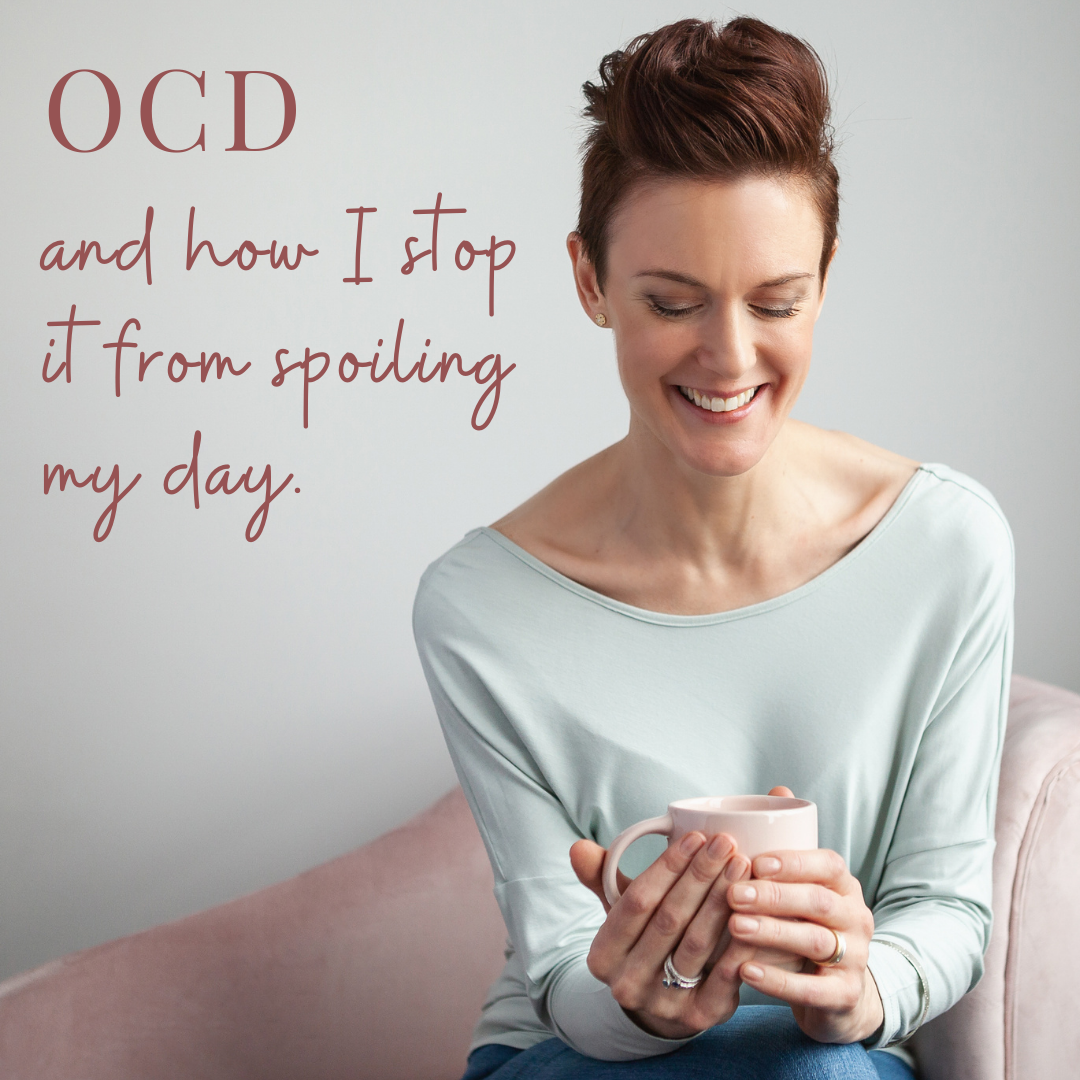"Are you familiar with the phrase OCD?" My therapist asked at our first appointment.
I'd spent the previous 15 minutes galloping, very tearfully and out loud, through all the thoughts in my head.
"Erm, yes" I replied, although feeling a little confused.
I mean, OCD is when people can't stop washing their hands or are obsessed with making sure their home is spotless, right? I couldn't see what relevance his question had in relation to anything I'd just said.
To give our meeting some context, the months leading up to that day had seen me spiralling down a rabbit hole of low mood, extreme anxiety and (what I now know to be) intrusive thoughts.
I'd become a new Mum for the second time and whilst I enjoyed the early months with my baby, I'd become obsessive in scrolling the internet - day and night - for answers to parenting problems; trying to 'fix' whatever it was I didn't feel I was getting just right. (SPOILER: no new parent will get everything right, it's an actual impossibility...I just didn't know it at the time).

It was 2013 and our youngest son was just 5 months old. In this photograph he was accompanying my husband and I to a friends wedding. It was a lovely day, but internally it was marred for me by the extreme anxiety that I was experiencing at the time. You just wouldn’t tell from the picture though, would you?
This anxiety I was already feeling was being fuelled by intrusive thoughts that seemed to come out of nowhere. The thoughts were shocking and upsetting. They always related to our childrens' safety and welfare. Because they were shocking, I would replay the thoughts over and over in my head, questioning why I would have them in the first place; Did I really want those things to happen? What kind of awful person did it make me? Was I safe to be around them?
So when my therapist explained that the C part of OCD can also mean compulsively going over and over thoughts and images that our brains throw up for us, it made a lot more sense.
Here's the bit that made a big difference - although in truth it took me a long time to believe.
It wasn't the thoughts that were the problem; it was the attention that I was paying to them that was the issue.
Unfortunately, I really was paying a lot of attention to them because I was already feeling in a very anxious state (oh, hi new motherhood).
Of course, my brain naturally wanted to get rid of those thoughts. Who wants upsetting thoughts spoiling their day? Plus I felt such shame for having them, I was constantly experiencing feelings of isolation and loneliness by this point.
How to get rid of them? I figured a way of doing this would be to replay, reassure myself, and to 'fix' what my head had thrown up at me and therefore make everything ok again.
Guess what? It didn't.
In fact it made it worse. My brain (or the OCD I now know) just built itself excellent and very firm foundations. My memory of what I thought I'd thought started to become unclear, so I then spent even longer ruminating on what I thought I remembered of a particular thought or situation.
I was now spending so much of my day going around in circles, trying to reassure myself I wasn't a 'bad person' for the thoughts that were cropping up that I hadn't realised I was now in an exhaustive, compulsive cycle.
My therapist posed another question.
"Kate, how many people that I treat do you think have these kind of thoughts?"
"Well, I would have said not many" I replied.
I thought some more.
"Hang on though, I think I'm quite a normal person. If that's the case, then perhaps quite a few?"
"A LOT of people, they just don't talk about it" he said.
My education about OCD started that day and I guess I've been learning ever since.

Before moving onto how I manage unwanted thoughts and the OCD that can build as a result, I thought it would be helpful to actually look at how OCD can present itself in this particular way, which maybe, like me, you didn't even know was a thing.
I've started off by breaking down each part of the condition as it's easy to use OCD as a throwaway adjective, but looking at the individual elements helped me to understand it a little more, so here we go:
As humans, some of us can become really worried by such things as cleanliness, our families safety, our own health, fear of losing control of our self by acting on thoughts or impulses (which is where mine stemmed from), such as harming someone. This causes a huge amount of distress (OCD is never about anything pleasant by the way) that we become obsessed with thinking about and trying to work out ways of counteracting/fixing these 'problems', which nicely leads on to.....
C is for Compulsion.
It's the bit where we develop a habit that we believe will be a way of relieving the stress that the O bit causes. For me, this was going over and over the intrusive thoughts I had experienced relating to our young children to make sure that I didn't really think them and to make sure I wasn't a bad person as a result. Fun times indeed.
OCD is an anxiety driven Disorder (that's the D bit).
OCD feeds off anxiety. And guess what? The anxiety grows the more we indulge in compulsive behaviour. It basically turns into a really horrible cycle.
The tips I've shared below are clearly not exhaustive. I'm not a therapist (you knew that though, didn't you?). They are strategies I have learnt and put in to practise (the latter being the crucial bit) over the course of years of therapy. I also take medication to help with anxiety and OCD that was prescribed by metal health professionals. I'm not in any way claiming to be a professional. But, I am an expert on my own experiences and in passing them on to you...
+ You may recognise some of the things I have described in this post and realise that it isn't just you. Yep, that's what I thought for so long. Believe me, it isn't just you.
+ It may encourage you to seek professional help. Or simply talk to someone you trust about how you have been feeling.
+ You may find some benefit from the tips below.
Ok, so when OCD strikes, this is what I do....
1. I remember the great quote that I read once that stated "A habit is easier to quit at the beginning than at the end" and it is so true. Rather than indulging in the compulsion to make things feel ok (by the way, compulsions NEVER work, they just keep me locked in the same miserable cycle) I do my very best to stop them before they begin. And yes, this is the really, excruciatingly hard bit. But I now know that the discomfort that I feel right now in resisting the compulsion, won't and can't last forever. It will spike and gradually fade, but only if I allow it to.
2️. Whatever form they show up as, trust me when I say that compulsions don't work. Ever. Performing a compulsion will make you feel better for a few minutes or even hours, but that relief will be replaced by some other doubt or worry that will cause you to repeat the compulsion. It's time to break the cycle.
3️. I move rooms, put some music on, strike up a conversation, focus on what it is I am meant to be doing in the here and now. ANYTHING that delays my ability to act on the compulsion. If it's early in the morning and I'm lying in bed awake, going over and over something in my head (a form of compulsion) I now know to just get to up, start moving and make a cup of tea, get a shower....even if it's too early. It's worth it to avoid getting dragged further into a rabbit hole in my mind.
4️. I remind myself that the thoughts are not the problem. They are not my fault. We can't control our thoughts and everyone gets weird or unsettling ones. It's how I'm reacting to them that's making me feel so crap/rubbish/super stressed. I try to notice the intrusive thought (and the ensuing urge to pay lots of attention to it because it has upset me), and give OCD the side eye. I'm basically saying "Yeah, I know what you're trying to drag me into, but it isn't happening".
5. The illness that is OCD is a massive bully. It can make you think and feel the worst about yourself, but it isn't true. The clinical psychiatrist that I saw always encouraged me to say "This isn't Kate, this is the illness", in a bid to help me separate myself from the intrusive thoughts.
6. I also remind myself the bit about OCD being an anxiety driven disorder. I look at what else has been going on for me that week that could have raised my stress levels; what's made me feel more anxious, worried or nervous than usual? It's only then that I realise that the OCD didn't just pop up out of nowhere for no reason. It's most likely made an appearance thanks to other stressful factors in my life. OCD can also feel more intense when I am premenstrual, so I know to take even less notice when it's that time of the month!
7. Now, rather than spending time trying to battle with the thoughts and compulsions, I focus on what I can do to help myself relax instead. It shifts the attention from the OCD and onto being kinder to myself. Relaxation is key here. It might mean taking time out of your day or evening to do something that you know you find relaxing: exercise, drawing, chatting to a friend, gardening, jig sawing, cooking.....anything that YOU find helps you to feel calmer.
8. By engaging in relaxing activities, you are actually creating a two pronged effect in beating the OCD! Firstly, your brain is busy focusing on much lovelier stuff than the horrible/upsetting or negative thoughts you were focusing on before. You are no longer prioritising them and in turn this sends signals back to your brain that maybe they aren't as important after all. Remember the bully I talked about? Believe me when I say that it starts to lose its grip once you start ignoring it. Secondly, when you do start to feel a little calmer, because you are doing something nice for yourself, your anxiety will lower. Which again gives the OCD less of a playground to have fun on and it naturally starts to diminish.
As I said, these tips are not exhaustive, but I have found them super helpful to keep in mind when my OCD starts trying to assert it's power.
I'd love to hear from you below if you found any of the points that I've touched upon in the post to be helpful or if you'd like me to expand more on them. Thanks for reading!



















